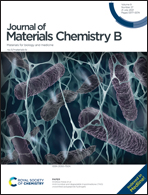Electrofabrication of flexible and mechanically strong tubular chitosan implants for peripheral nerve regeneration
Abstract
The development of peripheral nerve tissue engineering requires a safe and reliable methodology to construct biodegradable conduits. Herein, a new type of chitosan-based nerve-guide hydrogel conduit (CNHC) with enhanced mechanical flexibility in the wet state was fabricated using a one-step electrofabrication technology. The formation of the chitosan conduit is a physical process which can be conducted in a mild water phase without toxic crosslinks. The current density during electrofabrication has a profound effect on the physical and structural properties of the conduits. Cytocompatibility results indicate that the CNHC can promote cell proliferation and adhesion. Functional and histological tests indicate that the CNHC has the ability to guide the growth of axons through the conduit to reach a distal stump, which is closely similar to the autograft group. Overall, the results of this study demonstrate that the CNHCs from electrofabrication have a great potential in peripheral nerve regeneration.



 Please wait while we load your content...
Please wait while we load your content...